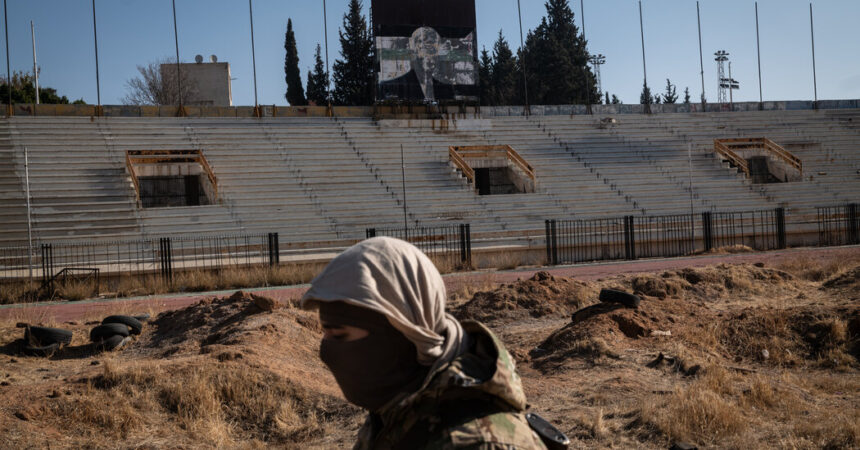There appears to be no end to the dark revelations revealed by the fall of Syria’s 54-year-old Assad regime.
Prisons were emptied, revealing the instruments of torture used against peaceful protesters and others seen as opponents of the government. Stacks of official documents show thousands of detainees. Morgues and mass graves house emaciated victims with broken bodies, or at least some of them.
Many others have still to find.
For these and other atrocities, Syrians want justice. The rebel alliance that toppled President Bashar al-Assad last month has sworn to track down and prosecute senior regime officials for crimes such as murder, unjust imprisonment, torture and gassing of their own people.
“Most Syrians would say they can only end this dark 54-year period by bringing these guys to justice,” said Ayman Asfari, president of Madaniya, a network of Syrian rights organizations humans and other civic groups.
But even assuming that the new authorities manage to find the suspects, it will be difficult to establish responsibility in a country as vulnerable, divided and battered as Syria. The experiences of other Arab countries whose despotic regimes have collapsed bear witness to the challenges: none of these countries – neither Egypt, nor Iraq, nor Tunisia – has managed to achieve comprehensive and lasting justice for the crimes of previous eras.
Syria faces particular obstacles. The country’s new de facto leaders are drawn from the country’s Sunni Muslim majority, while the ousted regime’s top brass was dominated by Alawites, a religious minority. That means prosecutions for abuses committed during the Assad era could risk fueling sectarian tensions in Syria.
The justice system has for years been little more than a tool for Mr. al-Assad, making him ill-equipped to deal with vast and complex human rights violations. Several thousand Syrians could be involved, far more than can be prosecuted, raising questions about how to deal with lower-level officials.
And after years of war, sanctionsof corruption and mismanagement, simply repairing the damage while ensuring the transition to a new government is an enormous task.
Nine out of ten Syrians live in poverty. The cities are in ruins. Houses were destroyed. Tens of thousands of people have been unjustly detained for years, even decades. Hundreds of thousands were killed in battle. Many are still missing.
Syrians will need time and many discussions to design a robust accountability process, said Nerma Jelacic of the Commission on International Justice and Accountability, which has for years been gathering evidence against Syrian regime figures.
“These are things that take time and never happen overnight,” she said.
But there is enormous pressure on Syria’s new leaders to start punishing the old ones, and transitional authorities in the capital, Damascus, have promised to do so.
“We will not stop holding accountable the criminals, murderers and security and military officers involved in the torture of the Syrian people,” Ahmed al-Shara, Syria’s de facto leader, said in a statement. an article on Telegram in December. He added that they would soon publish the “No. 1 List” of senior officials “involved in the torture of the Syrian people.”
Finding such numbers will be difficult, if not impossible. Mr. al-Assad has found refuge in Russia, which is unlikely to abandon him. Many of his main associates have disappeared, some reportedly hiding in Lebanon or the United Arab Emirates.
Yet Syrian human rights groups in exile began laying the groundwork more than a decade ago, collect evidence for prosecution which were staged in other countries – and one day, they hoped, in their own.
But Fernando Travesí, executive director of the International Center for Transitional Justice, which has worked with these Syrian groups, warned that before pursuing prosecutions in Syria, authorities should first earn the trust of citizens by building a state that meets their needs.
This would avoid the missteps of a country like Tunisia, where the lack of economic progress in the years following the 2011 Arab Spring revolution left many people bitter and disenchanted. In 2021, Tunisians had turned against their nascent democracy, throwing their support behind a president who had become great. more and more authoritarian. Efforts to bring members of the feared security services and friends of the regime to justice are now functionally suspended.
“Any process of truth, justice and accountability must come from institutions that enjoy a certain legitimacy and credibility among the population, otherwise it will be a waste of time,” said Mr. Travesí. Providing crucial services, he added, would encourage Syrians to view the government as “not a tool of repression; this meets my needs.
The transitional government can take basic but vital steps, such as helping refugees who left years ago obtain new identity documents, deciding what happens to property stolen or occupied during the war, and providing electricity and running water stably. It will need to provide humanitarian aid and economic improvements, even if these maybe only possible with the help of other countries.
And it must do all of this impartially, otherwise Syrians might view accountability efforts as selective or politically motivated. After the overthrow of Saddam Hussein in Iraq in 2003, the US-led occupation and successive governments purged and blacklisted even low-ranking officials from the former ruling party without due process, resulting in analysts said undermined confidence in the new system.
“The only way to heal the wounds of other communities is to ensure they are fairly represented,” Asfari said.
The Syrian authorities are showing that they understand. They have repeatedly pledged to respect minority rights and promised amnesty to rank-and-file soldiers who were forced to serve in Mr. al-Assad’s army. Most civil servants were allowed to stay to ensure the functioning of the institutions.
Any prosecution “has to be a good process, otherwise it will look like score-settling,” said Stephen J. Rapp, a former international prosecutor and former U.S. ambassador for global justice who has worked on Syrian abuses for more than a decade . “And it can play a key role in reconciling a society and defusing efforts to settle scores, for example against the children of parents who committed these crimes. »
To complicate matters further, some of the documents that will be crucial to mounting a prosecution were damaged in the chaos following Mr al-Assad’s fall, with regime prisons and intelligence archives ransacked, looted or burned, said Ms. Jelacic of the Commission on International Justice and Accountability.
Because Syria remains under war sanctionsHis group and others trying to save these documents for future use in court cannot operate in much of the country, further undermining their efforts.
The mass graves and torture devices are only the most blatant evidence of the abuses overseen by Mr. al-Assad and his father, Hafez.
Almost all Syrians, in one way or another, were wronged by the old regime. So it’s not enough to prosecute individuals for crimes committed during the civil war, say veterans of justice efforts in other countries that have experienced political transitions.
Mr. Rapp called for a “broader process of truth-telling” that could help “really begin to understand the system of state repression that Syria has been for the last 54 years, and this murderous machinery that is Syria” since 2011.
A model could be the Post-Apartheid Truth and Reconciliation Commission in South Africa, which heard testimonies from victims and perpetrators of rights violations, offered reparations to victims and, in some cases, granted amnesties.
Ms Jelacic said Syria would need a broader reckoning with the legacy of the Assad regime which “contributes not to divisions, but to healing”.
Before the trials begin, experts say, Syria should overhaul its police and justice system and put in place a legal framework to deal with rights violations, perhaps creating a special court to prosecute the most serious crimes. It is equally urgent to find out what happened to the estimated 136,000 people who remain missing after being arrested by the Assad regime and to identify the bodies found in mass graves.
But Syria cannot wait too long to pursue former regime officials. The slow pace of official justice leaves room for angry people to take matters into their own hands, which could trigger cycles of violence and deepen sectarian divisions. Scattered assassinations and threats against minorities favored by the Assad regime have already been reported.
After the Tunisian revolution, long delays in submitting applications against former security officials reinforced citizens’ feelings that their new democracy was bankrupt.
Lamia Farhani, a Tunisian lawyer who has long sought justice for the fatal shooting of her brother while protesting the previous regime in 2011, said her country’s disillusionment allowed current President Kais Saied to dismantle his democracy.
“We had a fledgling democracy that failed at the first storm,” she said. “And all this happened because there was no real reconciliation.” »









